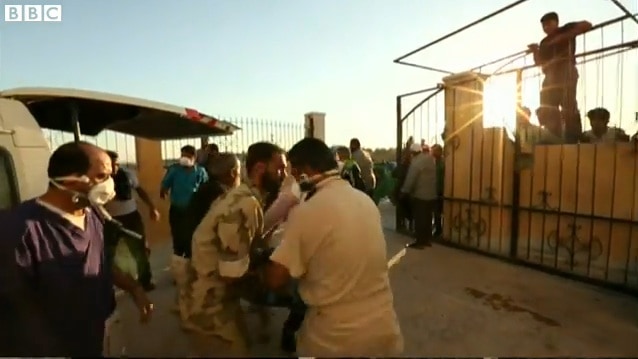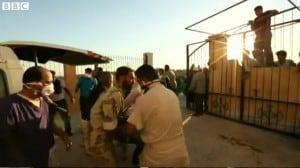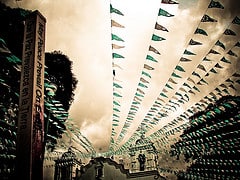Is it possible for there to be nothing — either practically or morally, by force or persuasion or any other means — that we can do to improve a terrible situation? And when we reach that point, when we can do nothing except fast and pray and cry out to heaven, are we really doing anything at all? Or are we just sticking our heads in the sand and hoping that God will somehow, magically, make it all better?
Faced with real tragedy and suffering, prayer can seem like a terrible answer. It seems weak and insufficient and cowardly — I know. So am I. So are we.
***
I have been woefully under-informed about the situation in Syria. A summer of travel has made it easy to miss much of the news, and the news that I have read has been so bleak that I have not sought out more. Further, the fact that no one — and I do mean no one — seems to understand what’s really going on, and yet everyone seems to have an opinion about whether or not we should be attacking Syria to enforce the “red line” against chemical weapons does nothing to encourage me to read more about it.
And yes, I’m aware that I’m contributing to the very problem I’m critiquing. So if you’re reading this: congratulations. Simply by clicking the link to get here, you’re already doing better than I am most days.
I have no answers to offer and no coherent position about what we should do about Syria. What I have instead is this mess that you are (thank you) apparently willing to read — an account of my wrestling with a situation that has no good options and far too many bad ones. The question is whether or not landing at prayer as the last option available is merely where we run out of conviction and courage or where God is actually at work. Can prayer be an answer, or is it just a cop-out?
That question is only sharpened by the non-stop torrent of news from Syria that I can’t manage to ignore, no matter how attractive ignorance would be. Shortly after finishing my travels and returning home, I had resumed my normal morning routine, which includes listening to BBC news on the radio — and suddenly I was hearing the screams of burned children, a doctor weeping about the innocents being massacred whom she could not save, and a Syrian man asking the world “isn’t it our right to live? Isn’t it?” The video version of that radio report is here — though I must warn you that it is beyond difficult to watch.
These weren’t even the sounds from the aftermath of the chemical weapons attack. This attack involved “conventional” incendiary bombs which killed children without crossing any red line. And yet, they are horrible enough; the suffering on that video is more than sufficient to cry out for some kind of response.
***
As the debate over responding to the atrocities in Syria continues, I find myself uncomfortably reminded of the days before the 2003 U.S. invasion of Iraq. At the time, I bought into the idea that we had no other good options, that we could intervene quickly and effectively to remove a tyrant, and that resorting to war was unfortunate but necessary. Of course, in the years since, that logic has been revealed as bankrupt, with the bad debt measured at more than a hundred thousand deaths. I am unwilling to convince myself again as easily that my country is justified in the use of violence.
Especially, I am reluctant to accept that we have no other option but war — that we have been painted into a corner by the president’s “red line” declaration and that we must now be willing to shoulder the cost of demonstrating our own “credibility.” The currency with which our credibility will be bought is bodies: the inevitable victims of our cruise missiles, bombs, and drones and the further victims of whatever retaliation and instability can be attributed to our attacks. And yes, it is already true that the price of our inaction is being paid with the bodies of burned and dead children, the nearly fifteen hundred victims of the chemical weapons attack, and the more than hundred thousand already killed in the Syrian civil war. Doing nothing is clearly not a good option, but that does not of itself make any of the other options any better.
One reason I am unwilling to settle for what seems inevitable is because I’ve also been wrestling with the Church’s teaching on just war, which requires not only that military force be the last resort, but also that its use have a serious prospect of success and not produce evils graver than those it aims to redress. Plenty of other people have been wrestling with it as well. None of the analyses I have read about the conflict in Syria, from any point on the political spectrum, seem to have any real hope of a cruise missile strike, or for that matter anything else, succeeding in ameliorating the violence in Syria. Nor does it seem reasonable to intervene against one violent sectarian force so that another violent sectarian force may rise in its place, when neither seems credibly committed to respecting the rights of the other. I confess that I have no idea whatsoever how to evaluate the gravity of whatever harm may follow from a (further) loss of U.S. credibility when we next threaten violence to enforce international norms, though I find it hard to believe that our credibility will be much improved by demonstrating that we are in fact capable of blowing up targets of our choosing without putting American lives at risk. Everyone already knows we can do that.
***
In the course of writing this piece, I have veered (as you may have already noticed) from anger to uncertainty to absurdity. Not only do I not know what I think our government should do, I do not even know what the right set of questions is to ask to begin to think about it. And I find myself in the bizarre position of being grateful that President Obama has taken the radical step of permitting a vote before committing the military forces of a constitutional democracy to action, yet afraid that the debate will be less about the prudence and justice of such a course and more about our “credibility” and the partisan advantages to be gained or lost thereby.
I remind myself that Syria is half a world away, and wonder whether or not it is in fact good that modern media can make the suffering and violence there so immediately present to us; in many ways, I would prefer not to know what is going on, and this too leaves me frustrated and angry at my own moral cowardice. I am less connected to the plight of those suffering here in Boston than I am to those suffering in Damascus, and I am only too aware that I have done little to nothing to share in or ameliorate the suffering of either. And I am grateful — though this too feels cowardly — that the decision of what to do about Syria is not mine to make.
The Catholic understanding of just war also includes the principle that evaluating the legitimacy of use of force “belongs to the prudential judgment of those who have responsibility for the common good” — in other words, to our elected representatives and leaders. To politicians. To human beings, as fragile, frail, and fallible as any of the rest of us. And because we are blessed with a democracy, it belongs, through them, to all of us citizens of these United States. Whatever is done in Syria will be done in our name.
Neither the Church nor the Pope has any special competence to evaluate the morality of the proposed military intervention in Syria; teaching authority can legitimately propose the moral principles which must govern such judgment, but their application must be prudential, and that prudence belongs to those with whom the actual authority rests.
What the Church can offer is a hope for peace that goes beyond the calculations of realpolitik, and it is that hope that I hear expressed in Pope Francis’s call for a day of prayer and fasting for peace on September 7. What the Church can offer is the forceful warning that “war begets war, violence begets violence,” and a hope for refusing the logic by which violence becomes inevitable as the least of many evils.
That hope is founded, as Pope Francis says, on a “culture of encounter and a culture of dialogue [as] the only way to peace.” That is, of course, idealistic in the extreme, and it does not come with any concrete proposal for how it might be realized in the face of those of who are willing to kill children to maintain their political power. It is founded instead on the power of the One who can “touch the heart of everyone so that they may lay down their weapons and be let themselves be led by the desire for peace.”
More than anything else, that is what I will be praying and fasting for on September 7th.
***
It is, paradoxically, possible to pray for something for which we do not (yet) know how to hope, because we are at the same time praying for our capacity for hope, for the strength of our desire for peace and the willingness of everyone involved to imagine it, to be deepened by God’s grace; we are fasting in penance for the ease with which we resort to violence, and that our hunger for peace may grow stronger. So I will be praying for peace in Syria, even though I have no idea how that peace may be achieved. There are more proximate hopes to be prayed for as well: for a deeper solidarity with the victims of violence, for a greater commitment to humanitarian relief, and especially for those of us in the U.S.A., that our elected representatives will debate the real questions of justice more than the narrow concerns of “credibility” and national interests.
None of this, I say again, is sufficient, and it runs the risk, as all such calls for prayer do, of legitimating passivity and pushing back to God the responsibilities for justice and peace which have been entrusted to us. Recourse to prayer could be a way of avoiding costly and difficult choices — but it can also give us the necessary courage to refuse to make a bad choice simply because no good ones are available.
I do not know whether or not the U.S. armed forces are capable of doing anything which could improve the situation in Syria. I do not know whether we should be hoping for a well-planned military action which manages to remove or cripple the Assad regime in one strike (which seems unlikely) or for a miraculous change of heart which brings Assad to the negotiating table (which seems impossible).
What I do know is that God is not limited to the logic of the least-bad option. What I believe is that God does not wish for us for us to be so limited either. That is why I will be praying and fasting on September 7th. Without knowing how to hope for peace and even while acknowledging that it seems unlikely that peace will prevail, that is what I am praying for now.




